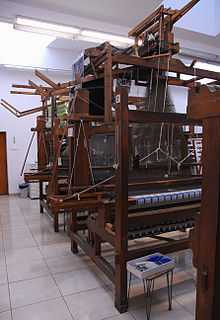Jacquard loom


This portrait of Jacquard was woven in silk on a Jacquard loom and required 24,000 punched cards to create (1839). It was only produced to order. Charles Babbage owned one of these portraits; it inspired him in using perforated cards in his analytical engine.[2] It is in the collection of the Science Museum in London, England.[3]
The Jacquard loom is a mechanical loom, invented by Joseph Marie Jacquard, first demonstrated in 1801, that simplifies the process of manufacturing textiles with complex patterns such as brocade, damask and matelasse.[4][5] The loom was controlled by a "chain of cards", a number of punched cards, laced together into a continuous sequence.[6] Multiple rows of holes were punched on each card, with one complete card corresponding to one row of the design. Several such paper cards, generally white in color, can be seen in the images below. Chains, like the much later paper tape, allowed sequences of any length to be constructed, not limited by the size of a card.
It is based on earlier inventions by the Frenchmen Basile Bouchon (1725), Jean Baptiste Falcon (1728) and Jacques Vaucanson (1740)[7] A static display of a Jacquard loom is the centrepiece of the Musée des Tissus et des Arts décoratifs (fr)[8] in Lyon. Live displays of a Jacquard loom are available at a few private museums around Lyon and also twice a day at La Maison des Canuts, as well as at other locations around the world.
Principles of operation
Each position in the card corresponds to a "Bolus" hook, which can either be raised or stopped dependent on whether the hole is punched out of the card or the card is solid. The hook raises or lowers the harness, which carries and guides the warp thread so that the weft will either lie above or below it. The sequence of raised and lowered threads is what creates the pattern. Each hook can be connected to a number of threads, allowing more than one repeat of a pattern. A loom with a 400 hook head might have four threads connected to each hook, resulting in a fabric that is 1600 warp ends wide with four repeats of the weave going across.
The term "Jacquard loom" is a misnomer. It is the "Jacquard head" that adapts to a great many dobby looms that allow the weaving machine to then create the intricate patterns often seen in Jacquard weaving.
Jacquard looms, whilst relatively common in the textile industry, are not as ubiquitous as dobby looms which are usually faster and much cheaper to operate. However, unlike jacquard looms, they are not capable of producing so many different weaves from one warp. Modern jacquard looms are controlled by computers in place of the original punched cards, and can have thousands of hooks.
The threading of a Jacquard loom is so labor-intensive that many looms are threaded only once. Subsequent warps are then tied in to the existing warp with the help of a knotting robot which ties each new thread on individually. Even for a small loom with only a few thousand warp ends the process of re-threading can take days.
Importance in computing
The Jacquard head used replaceable punched cards to control a sequence of operations. It is considered an important step in the history of computing hardware.[9] The ability to change the pattern of the loom's weave by simply changing cards was an important conceptual precursor to the development of computer programming and data entry. Charles Babbage knew of Jacquard looms and planned to use cards to store programs in his Analytical engine. In the late 19th century, Herman Hollerith took the idea of using punched cards to store information a step further when he created a punched card tabulating machine which he used to input data for the 1890 U.S. Census.
-

Close-up view of comber board, harness, mails, weights (Lingoes) and warp with 1040 ends
-
Punched cards in use in a Jacquard loom. German Museum of Technology, Berlin
-

weaving shuttle on a jacquard sample
-

Punched card loom mechanism in silk-weaving workshop; Varanasi, Uttar Pradesh, India
-

Weaver in a silk-weaving workshop; Varanasi, Uttar Pradesh, India
-

Close-up view of the 8 × 26 hole punched cards—one card per pick (weft) in the fabric
-

Jacquard looms in the Textile Department of the Strzemiński Academy of Fine Arts in Lodz, Poland.
-

Weaving on a jacquard loom with a flying shuttle at the Textile Department of the Strzemiński Academy of Fine Arts in Lodz, Poland.
-

Following the pattern, holes are punched in the appropriate places on a jacquard card at the Department of Textile Art at Strzemiński Academy of Fine Arts in Łódź, Poland.
-

Detail of Dove and Rose jacquard-woven silk and wool double cloth furnishing textile, designed by William Morris
References
- ↑ "From cave paintings to the internet". Historyofscience.com.
- ↑ Hyman, Anthony, ed. Science and Reform: Selected Works of Charles Babbage, Cambridge, England: Cambridge University Press, 1989, p. 298.
- ↑ Delve (2007), p. 99.
- ↑ Eric Hobsbawm, "The Age of Revolution", (London 1962; repr. 2008), p.45.
- ↑ "Fabric Glossary". Retrieved 2008-11-21.
- ↑ The London journal of arts and sciences (and repertory of patent inventions). June 1, 1866. p. 334.
- ↑ C. Razy p.120 (1913)
- ↑ "Musée des Tissus et des Arts Décoratifs". Museedestissus.com. Retrieved 2013-10-05.
- ↑ Essinger, James (2004). Jacquard's Web: How a hand-loom led to the birth of the information age. Oxford: Oxford University Press. ISBN 0-19-280577-0.
Sources
| Wikimedia Commons has media related to Jacquard looms. |
- Razy, C. (1913). Étude analytique des petits modèles de métiers exposés au musée des tissus. Lyon, France: Musée historique des tissus.
| |||||||||||||||||||||||||
This article is based on material taken from the Free On-line Dictionary of Computing prior to 1 November 2008 and incorporated under the "relicensing" terms of the GFDL, version 1.3 or later.


